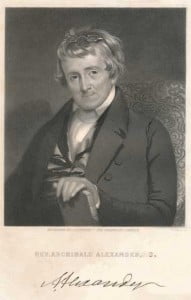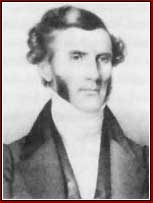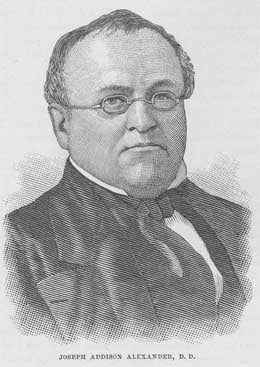A Professor to Three Students
 It has been in operation since 1746. And the College of New Jersey had provided the Church, and especially the Presbyterian Church in the United States of America, with many of its pastors and missionaries. But as the nineteenth century began, many of the College’s graduates were preparing for other careers, like law, politics, and education. Something had to be done to remedy the denomination’s critical need to fill 400 empty pulpits.
It has been in operation since 1746. And the College of New Jersey had provided the Church, and especially the Presbyterian Church in the United States of America, with many of its pastors and missionaries. But as the nineteenth century began, many of the College’s graduates were preparing for other careers, like law, politics, and education. Something had to be done to remedy the denomination’s critical need to fill 400 empty pulpits.
The proverbial ball began rolling when the Rev. Ashbel Green, pastor of the Second Presbyterian Church of Philadelphia, gave a challenging speech before the assembled elders gathered at the May 1805 General Assembly. In 1808, the Presbyterian of Philadelphia overtured that General Assembly begin a theological school. Four years later, the Assembly voted to establish such a school and to locate it in Princeton, New Jersey. Later in that same Assembly, the elders in a spirit of prayer voted the Rev. Dr. Archibald Alexander to be the first professor of Princeton Theological Seminary. The date was June 2, 1812.
Archibald Alexander had been prepared by the Holy Spirit for this important ministry. Blessed with an heritage of Scotch-Irish forefathers, and a father who was a Presbyterian elder, his family first settled in Pennsylvania before relocating to Virginia. Archibald was born in 1772 and by the age of seven, had learned the Shorter Catechism and was moving on to the Larger Catechism. He sat under the celebrated William Graham at Liberty Hall Academy, forerunner of Washington and Lee College. And yet with all of this training, Archibald was still unsaved. It wasn’t until he was sixteen that he was brought to a saving knowledge of the Lord Jesus. More theological training took place which culminated in his ordination by Hanover Presbytery in Virginia in 1794 as a Presbyterian minister.
From there his ministry activities went from the rural pastorate, to Hampden-Sydney College as president, to a revival preacher in New England, delegate to the General Assembly, minister of a congregation in the large city of Philadelphia, and finally to the first professor of Princeton Seminary, at the age of forty. At the beginning of this new and challenging ministry, he had three students in 1812. But the number wouldn’t stay there very long. Princeton Seminary had begun.
Words to Live By: Everything which occurs in your life is for a purpose, a purpose overseen by a loving Father. When you are enabled to see that biblical truth, your life, and how you view it, takes on a sacred calling. There is a good reason why the Apostle Paul commands us “give thanks in all circumstances; for this is the will of God in Christ Jesus for you.” (ESV – 1 Thessalonians 5:17)
For Further Reading:
The Inaugural Discourse delivered by the Rev. Dr. Archibald Alexander, upon his installation as the first professor at the Princeton Theological Seminary, can be read in full, here. This Discourse has also recently been reprinted in volume 1 of Princeton and the Work of Christian Ministry, edited by James M. Garretson (Edinburgh: The Banner of Truth Trust, 2012), pp. 114-142.
Alexander’s opening words in that discourse:
Highly Respected and Venerable Directors of the Theological School, and other Learned and Respectable Auditors, convened on the present solemn occasion!
The institution and commencement of a theological seminary, under the patronage and direction of the General Assembly of our church, ought to be a subject of mutual congratulation to all its members. But it cannot be concealed, that the same causes which have operated to render such an institution urgently necessary, have also opposed serious obstacles in the way of carrying it into effect. The deficiency among us, of that kind and extent of learning requisite to confer dignity and respect, as well as usefulness, on the professor’s chair, is too obvious to require remark. But every important institution must have its infancy and growth, before it can arrive at maturity; and however long we might have deferred this undertaking, the same difficulties would probably have met us at its commencement, which we are not obliged to encounter. The sentiments and emotions by which my own mind is agitated, in consequence of the new and important station in which I find myself placed by the choice of my brethren, and especially, the deep sense which I entertain of my insufficiency for the work, I shall not attempt to express. If the design be of God, he will prosper the undertaking, notwithstanding the weakness of the instruments employed in carrying it on; and will crown our feeble efforts with success. On him therefore may our hope and confidence be firmly fixed; and may his ‘will be done on earth as in heaven’!
I have selected, as the subject of the discourse now required of me, the words of our Lord, recorded in the 6th chapter and 39th verse of the Gospel according to John:
ἐραυνᾶτε τὰς γραφάς, Search the Scriptures.
Dr. Alexander then proceeded to the body of his discourse, which he closed in this fashion:
I beg leave to conclude this discourse in the words of the pious Weller, the friend and disciple of Luther:
I admonish you again and again, that you read the sacred Scriptures in a far different manner from that in which you read any other book; that you approach them with the highest reverence, and most intense application of your mind; not as the words of a man, nor an angel, but as the words of the divine Majesty, the least of which should have more weight with us, than the writings of the wisest and most learned men, in the world. [here Dr. Alexander is quoting from Weller’s Consilium De Studio Theologia.]



